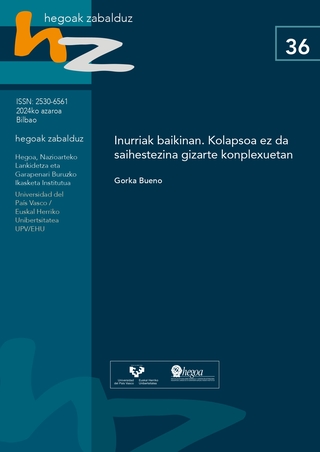
Inurriak baikinan. Kolapsoa ez da saihestezina gizarte konplexuetan
- 1169
- 189

Joseph A. Tainter antropologo eta akademikoak 1988an argitaratutako liburu batean defendatu zuen gizarte konplexuak kolapsora behartuta daudela konplexutasunaren errendimendu beherakorrak direla eta. Ondoren, Ugo Bardi irakasleak gidatutako talde batek kolapsorako joera hori egiaztatu du, sistemen dinamikaren modelo sinple baten bidez, ekonomia zirkularrik eta energia berriztagarrien aprobetxamendurik gabeko gizarte batean.
Ugo Bardiren taldearen analisi-esparrutik atera gabe, lan honek erakusten du, ordea, gizarte konplexu bat egoera egonkorrean eta kolapsotik urrun mantendu daitekeela baliabideen zirkulartasun-maila nahikoa lortzen badu, energia berriztagarriaren fluxuen aprobetxamenduan oinarriturik. Era berean, ezinbestekoa da zibilizazioaren funtzionamenduak berrelikadura negatiboak izatea, ekonomiaren hazkundea kontrolatuz, egoera egonkorraren lorpena eta ezegonkortasunen aurreko erresilientzia bermatzeko.
Inurriek adibide eder bat ematen digute: posible da sistema sozial konplexu bat lortzea, ingurunean inpaktu handia baina onuragarria duena. Konplexutasunak aukera eman die inurriei hamarnaka milioi urtez eboluzionatzeko, kolapsoa saihestuz.
Egungo zibilizazioaren kolapso-arriskuaren arrazoi nagusia ez da konplexutasuna, ezta ekonomiaren tamaina ere. Kolapsoa saihesteko, zirkularitatea handitu behar da, eta, batez ere, berrelikadura negatiboen bidez kontrol-mekanismoak sortu behar dira, egoera egonkor eta iraunkor batera eramango gaituztenak, non giza zibilizazioak bere beharrak ase ahal izango dituen, planetaren gainerako funtzionamenduarekin modu bateragarrian eta koherentean.
1. Sarrera
2. Zer da kolapsoa?
3. Kolapsoa modelizatzen
4. Inurriengandik zerbait ikas dezakegu?
5. Konplexutasunaren kolapsoari buruzko Bardi et al.-en modeloa osatuz
6. Laburpena eta ondorioak. Kolapsoa ez da saihestezina gizarte konplexuetan
7. Erreferentziak